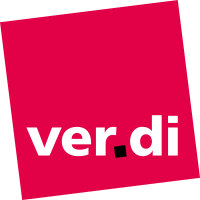Vereinte Dienstleistungsgewerkschaft
 |
|
| Full name | United Services Union |
|---|---|
| Native name | Vereinte Dienstleistungsgewerkschaft |
| Founded | 2001 |
| Members | 2,180,000 |
| Affiliation | DGB |
| Key people | Frank Bsirske, president |
| Office location | Berlin, Germany |
| Country | Germany |
| Website | www.verdi.de |
The Vereinte Dienstleistungsgewerkschaft (German United Services Trade Union), which is known as Verdi for short and writes its name as "ver.di", pronounced [ˈvɛʁdiː], is a German trade union based in Berlin, Germany. It was established in the year 2001 as the result of a merger of five individual unions and is a member of the German Trade Union Confederation (DGB). With around two million members, Verdi is the second largest German trade union after IG Metall. It currently employs around 3000 members of staff in Germany and has an annual income of approximately 454 million Euros obtained from membership subscriptions. The trade union is divided into 10 federal state districts and 13 divisions and is managed by a National Executive Board (Bundesvorstand) with 14 members. Frank Bsirske has been the Chairman of Verdi ever since it was first founded.
Verdi was established in March 2001 as the result of a merger of five individual unions, all of which, other than the DAG, had previously belonged to the German Trade Union Confederation (DGB):
The oldest forerunner of Verdi was the Association of German Printers (Verband der Deutschen Buchdrucker), which was founded in 1866.
Discussions on closer cooperation between German trade unions had already been conducted back in the 1990s. These negotiations not only involved the future founding partners of Verdi, but also the former Union of German Railway Workers (GdED), the German Education and Science Union (GEW) and the German Food, Beverages and Catering Union (NGG).
On 4 October 1997, the chairmen of the DAG, DPG, GEW, HBV, IG Medien and ÖTV signed the "Hamburg Declaration", in which they supported the reorganisation of the representation of trade union interests in the service sector. This resulted in the establishment of a steering committee that worked in close cooperation with the executive committees of the trade unions involved to develop the key aspects of the fusion and the structure of the future large trade union.
After the GEW had left the merger process, the heads of the DAG, DPG, HBV, IG Medien and ÖTV agreed on the merger in the German city of Magdeburg in June 1999. In autumn of the same year, they opened a joint office in Berlin and in November 1999, the delegates of the five unions held extraordinary union conferences at which they agreed to establish a transitional organisation (GO-ver.di).
...
Wikipedia
